Every weekend countless tourists take to the winding lanes of Taiwan's northern hilltop community Jioufen (
Once a thriving mining town in the 1940s, Jinguashi is now filled with abandoned shafts and architectural reminders of its Japanese colonial past. A newly constructed and recently opened Gold Ecological Park (
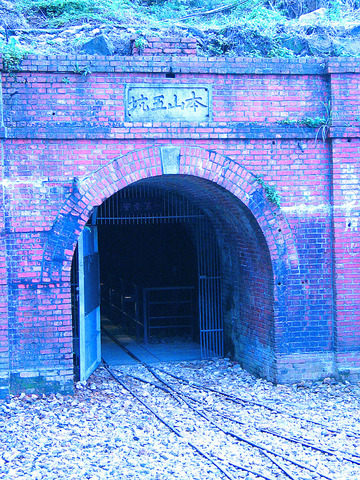
One of the best things about a trip to Jinguashi is that it is easily accessible on foot. Although it is possible to rent bicycles or scooters and even hire a taxi for the day, most of the trails are in the hillside and so walking gives people the opportunity to get off the beaten track.
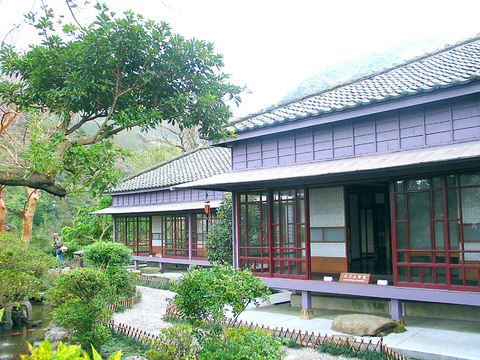
Starting at Jinguashi train station is a cluster of Japanese-style dormitories whose unique location in the countryside provides a popular backdrop for several Taiwanese television series. Ascending the mountain, visitors come to several points of interest with accompanying history written in both English and Chinese. To commemorate the opening of the ecological park, the former residence of a Japanese prince (
The highlight of the park is the Gold Museum (金礦博物館) and the reconstructed Benshan Fifth Tunnel (本山五坑). The main floor of the museum displays both photographs and a video presentation (with English subtitles) of the changes to the surrounding area. It is while being guided through the tunnel that visitors gain an appreciation of the working conditions in the mines and the difficulties the miners experienced. Along with recreated scenes from an average workday, there is accompanying information in both English and Chinese. Jinguashi was also the site of Kinkaseki (台灣戰俘營故事), one of the worst World War II prisoner of war camps in Taiwan. There is an area reserved in the museum as a memorial to the men who were held at the prison camp.
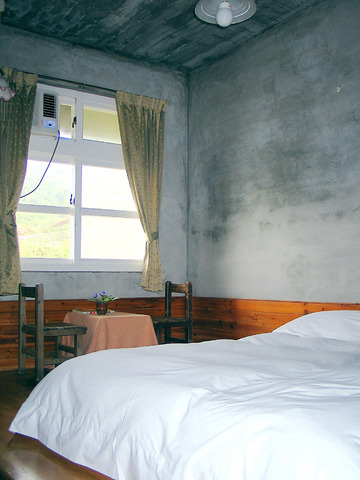
Near the park's exit are a series of snack shops selling food and beverages, as well as local specialties such as dried fruits and peanut candy. There is also a traditional lunchbox meal (NT$180) that comes packed in a metal box and cloth bag as a souvenir replica of those used by the miners.
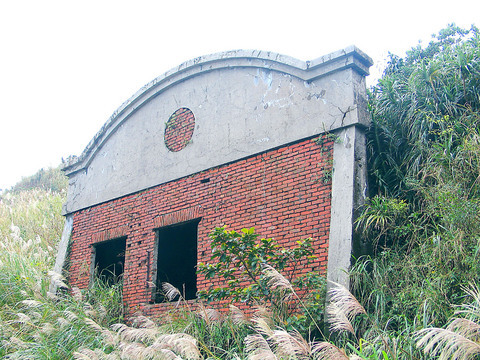
There might not be any gold left in the hills but there are plenty of paths to take for a leisurely stroll with charming views of the sea. One route takes visitors from Gold Waterfall (黃金瀑布) up a 15-minute walk to the rooftop of an enormous 13-level abandoned refinery (十三層舊礦場). From there, visitors can walk down toward the town, sea or or another lookout point which is close to a residential area.
With an early start, it is possible to spend the first part of the day at the ecological park and the afternoon wandering around either Keelung (雞籠山) or Wuerchahu Mountains (無耳茶壺山). From there, visitors can retire to a quaint guesthouse or join the crowds in Jioufen for shopping and tea.
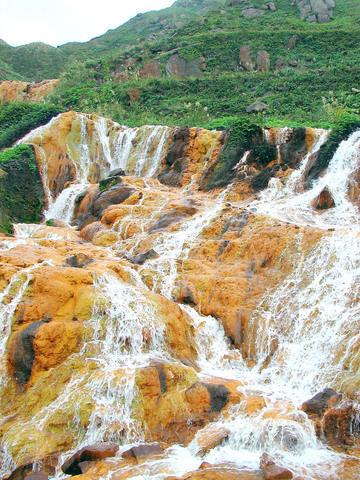
A guide service is available at NT$700, however requests for guided tours must be made two weeks in advance. For more information on how to apply and where to send the request contact the Northeast Coast National Scenic Area Administration.
Most of the guesthouses provide a free breakfast and offer lunch and dinner for NT$200 per person. Jinguashi doesn't boast any particular local specialty foods, but most people don't leave without trying the taro and sweet potato dessert soup (
Overnight
Jinguashi can be done as a day trip or turned into a more relaxed two-day excursion, especially if combined with Jioufen. Guesthouses are springing up in both locations and offer simple lodging for an average of NT$2,000 per double room. Rooms fill up quickly on weekends so it is recommended to reserve in advance.
Cloud Village (
Prices: NT$1,600 room per weekday NT$2,000 on weekend. (Based on double occupancy)
93-1, Ln 13, Sanjin Rd, Jinguashi, Taipei County (
A free shuttle service is provided from the Rueifang train station (
Telephone: (02) 2496 2291.
For pick up service: (0910) 105 148 or
http://www.cloudvillage.net
Getting There
By Rail: Take the Taipei-Hualien line and off at Jinguashi Train Station (
Several trains leave daily from Taipei Main Railway Train Station. Estimated travel time is one-and-a-half hours by express train.
By Car: From Taipei, take Badu or Keelung exits off of the Sun Yat-sen Freeway to connect with the Coastal Highway (Provincial Highway 2) or take the Taipei-Ilan Freeway and exit onto the Coastal Highway.
Further Planning:
Tourist Service Center Hotline: (02) 2499 1115 ext. 221
Northeast Coastal National Scenic Area Administration:
(02) 2499 1115
E-Mail: info@necoast-nsa.gov.tw
(02) 2960 3456
Websites: http://www.tpc.gov.tw

Taiwan has next to no political engagement in Myanmar, either with the ruling military junta nor the dozens of armed groups who’ve in the last five years taken over around two-thirds of the nation’s territory in a sprawling, patchwork civil war. But early last month, the leader of one relatively minor Burmese revolutionary faction, General Nerdah Bomya, who is also an alleged war criminal, made a low key visit to Taipei, where he met with a member of President William Lai’s (賴清德) staff, a retired Taiwanese military official and several academics. “I feel like Taiwan is a good example of

March 2 to March 8 Gunfire rang out along the shore of the frontline island of Lieyu (烈嶼) on a foggy afternoon on March 7, 1987. By the time it was over, about 20 unarmed Vietnamese refugees — men, women, elderly and children — were dead. They were hastily buried, followed by decades of silence. Months later, opposition politicians and journalists tried to uncover what had happened, but conflicting accounts only deepened the confusion. One version suggested that government troops had mistakenly killed their own operatives attempting to return home from Vietnam. The military maintained that the

Before the last section of the round-the-island railway was electrified, one old blue train still chugged back and forth between Pingtung County’s Fangliao (枋寮) and Taitung (台東) stations once a day. It was so slow, was so hot (it had no air conditioning) and covered such a short distance, that the low fare still failed to attract many riders. This relic of the past was finally retired when the South Link Line was fully electrified on Dec. 23, 2020. A wave of nostalgia surrounded the termination of the Ordinary Train service, as these train carriages had been in use for decades

Lori Sepich smoked for years and sometimes skipped taking her blood pressure medicine. But she never thought she’d have a heart attack. The possibility “just wasn’t registering with me,” said the 64-year-old from Memphis, Tennessee, who suffered two of them 13 years apart. She’s far from alone. More than 60 million women in the US live with cardiovascular disease, which includes heart disease as well as stroke, heart failure and atrial fibrillation. And despite the myth that heart attacks mostly strike men, women are vulnerable too. Overall in the US, 1 in 5 women dies of cardiovascular disease each year, 37,000 of them